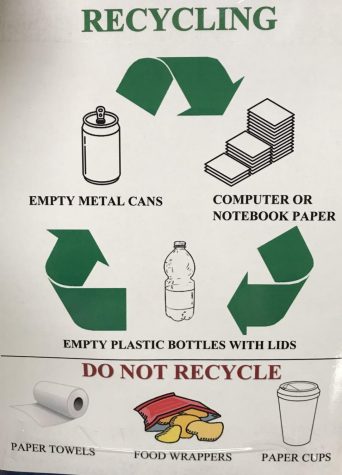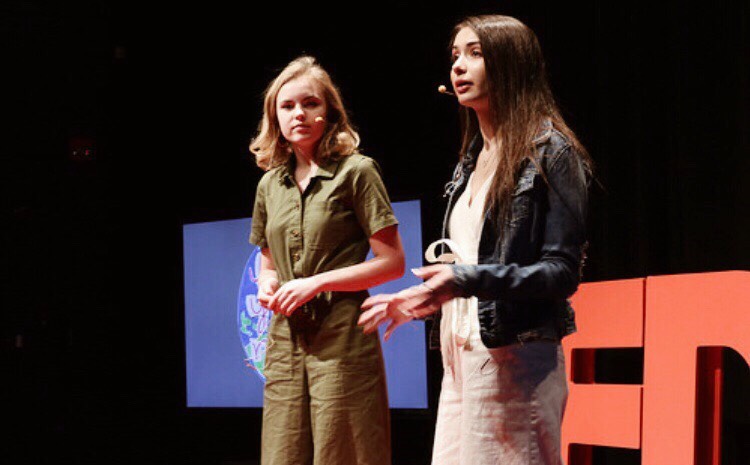Guest Author Cristina Machado: The LFHS Environmental Commission
February 26, 2019
Last April (2018), Emma Johnson and I (Cristina Machado) were ignited with the passion to improve Lake Forest High School’s sustainability.
Beginning in the spring of 2018, we formed the LFHS Environmentmental Commission: a group of motivated students, community members, and faculty that collaborate with facilities management to create sustainable habits to be implemented within the campus and the community.
Nationwide, Environmental Commissions act with a goal of revitalizing their communities by reviewing city and school ordinances and contracts that could have an environmental impact and suggest areas of improvement, as well implement smart growth, resource protection, green infrastructure, and environmental clean-ups.
As a commission, we would like to encourage student led activism and the implementation of green practices at our school. At Lake Forest High School, we have the resources to be one of the leaders of sustainable practices, but we can only achieve this progress through collaboration.
Now, in winter 2019, we have made some major progress. We are now a group of 16 students, 10 faculty members (including teachers and other staff) and community partners including CROYA. Currently, we have four student led groups: Recycling, Idling, Pond Restoration, and Chemicals & Pesticides. Each group is run by four students in the commission who create plans with the help of our faculty members and create presentations to spread their plan to community members.
As we are getting ready to give our final presentations to the Environmental Commission as a whole in the coming months, my group (Recycling) would like to share our progress with the student body.
Many rumors in regards to Lake Forest High School’s recycling habits have been swarming around the high school. In fact, in the video attached, 70% of those who were asked do not believe that LFHS recycles. Our group is here to clear up those rumors.
Lake Forest High School is currently recycling to its maximum capability right now. The rumors spark from the fact that this maximum capability is not a very high percentage of the overall recyclables in the walls of LFHS. This is not due to janitorial staff or poor faculty management, it is due to the fact that student do not know what can and cannot be recycled. If there is any kind of contamination (something that cannot be recycled) inside of a recycling bin, the WHOLE bin will be landfilled. The resolution of the problem lies on the students; we need to start educating and enforcing better recycling habits at our school.
As part of the recycling teams initiative to do just that, we have a few videos attached to this article. The first video shows many familiar faces being asked simple questions about what can and cannot be recycled, and the results are shocking. The second video is informational; it demonstrates exactly how to dispose of many of the most common forms of contamination within LFHS.
Furthermore, with the help of other members of the Environmental Commision and Environmental Science classes, our recycling group was able to perform a waste audit of our school. The results detailed that the average amount of trash in each trash can was 1.67 pounds per classroom per day and therefore in only classrooms, we generate about 31,673.22 pounds of waste per school year. To make matters worse, much of the waste in these trash cans are recyclable items.
On the other hand, when looking through LFHS’ recycling bins of ranging sizes, we found that 83% of the bins are contaminated. Meaning that 83% of all of the recycling bins are merely landfilled rather than properly recycled.
As a result to this shocking discovery, we will be spreading our informational videos into the classroom, redistributing recycling bins to more convenient areas, acquiring 5 new large recycling bins, and putting the following poster on each of the small classroom recycling bins (shown below).

The largest contaminate in our recycling bins is food, food can not be recycled under any circumstance. Any container (bottle or box) that contained liquid or food must be rinsed off completely before being recycled. Furthermore, paper towels and food wrappers (candy, chip) may not be recycled. Lastly, hot disposable coffee cups are the most tricky to recycle. The cardboard hand grip and lid may be recycled. Although the actual cup may not due to its plastic lining.
With all of these implements, we are hoping to increase the amount that Lake Forest High School is able to recycle. From you, we are asking that you please reduce the contamination within our school’s recycling bins by reminding yourself and your peers about what can and cannot be recycled. Recycle today for a better tomorrow!







Mr. Mergl • Mar 1, 2019 at 8:24 am
Great job Tina and Emma! I think we could use some signs to be posted over bins.